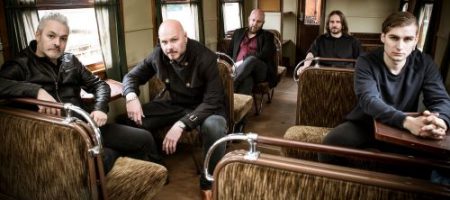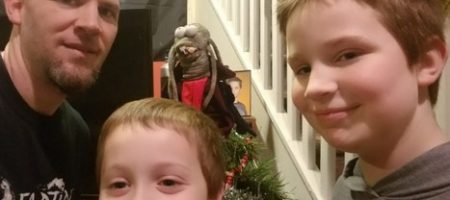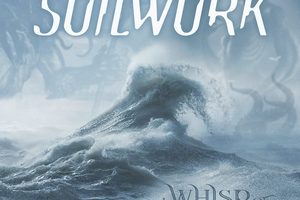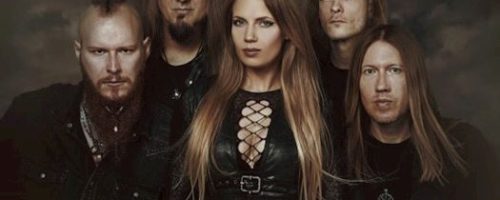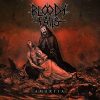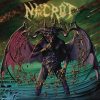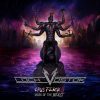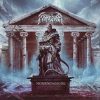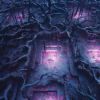Soilwork – Majestic Metal
Sunday, 13th September 2015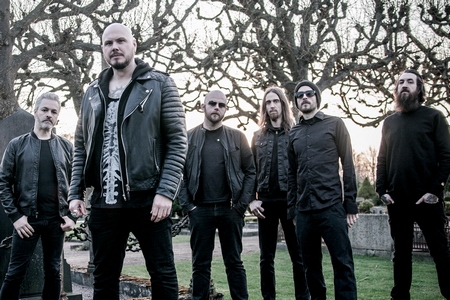
Many of Sweden’s melodic death metal greats have come and gone over the years (or been relegated to irrelevance), yet Soilwork has managed to stay ahead of the game for much of their twenty year lifespan. Most impressively, they’ve managed to do it with while going through a series of potentially damaging line-up changes. Somehow the band has been able to come out on top and found members that always bring something new to the table. Their latest line-up change occurred right before their newest album, The Ride Majestic, was to be recorded, losing founding bassist Ola Flink.
The band’s tenth album, The Ride Majestic manages to up the ante from the precedent-setting double album The Living Infinite. Taking a more exploratory look at the band while staying true to their roots, The Ride Majestic is one of their strongest albums in years. With a cd release party set at Duff’s Brooklyn, DR leapt at the opportunity to witness the event. Getting to do a brief chat with vocalist (and sole founding member) Björn Strid and drummer Dirk Verbeuren was icing on the cake so to speak. We were able to accomplish much in a little time, discussing bonus tracks, the band’s shift in dynamic, guest appearances, and more.
Dead Rhetoric: It seems like you’ve really abandoned the “safe” Soilwork dynamics, where you aren’t quite sure what you are going to get around the next corner. What were the lessons that you took from The Living Infinite?
Björn Strid: Absolutely. I think that album was crucial for us in many aspects. I think after Peter [Wichers] jumped off the band a second time, it was really important for us to really showcase some other songwriting talents in the band. We needed that challenge. I came out with the idea of making a double album and had a title at a pretty early stage. I planted a seed in everyone’s mind in that way. I think we rediscovered ourselves as songwriters and found something new through that album and had a different approach because it needed to be diverse and it wasn’t just making two Stabbing the Drama’s on top of each other; that wouldn’t work. It needed to stay interesting all the way though. So that album is very diverse and we gained a lot of confidence through writing and recording that album. We definitely took that with us for The Ride Majestic and you can definitely hear it in the album.
Dead Rhetoric: Likewise, some of the chaos with your music has returned with the last two albums, does some of this come back to the Scarve-combo of Sylvain [Coudret] and Dirk?
Dirk Verbeuren: It’s probably a little bit of that. I think it took us some time to grow into the band. It’s been like 10 years for me and 7 for Sylvain. The good thing, as I always say, is that Soilwork is always open to everyone contributing ideas. It was really up to us to do so. I’ve been stepping up the last two albums, and Sylvain has been writing stuff since The Panic Broadcast, but I think it is also definitely David [Andersson] and Björn as well. They’ve really stepped up their writing too and they’ve brought back some of the more ‘old-school’ things that had gone missing for a few albums. I think it’s really a band thing.
Dead Rhetoric: Initially you only put clean vocals on a Japanese bonus track on The Chainheart Machine (“Shadowchild”). Looking back to that time, would you have imagined that all this time later you would be one of the genre’s benchmark names in terms of clean vocals?
Strid: I think that I’ve managed to inspire and show the way in a sense. But then again, it was never really my plan to outshine other singers. It was just a natural call to take my vocals as far as possible and give each and every song exactly what it deserves. At the same time, it was not a matter of ‘you know what, I’m just going to do those crazy kind of vocals there because no one would expect it.’ It’s been a natural thing for me and I needed it to be a challenge. I’m proud of myself for coming this far and being able to develop my vocals in the way that I have. I still feel that I develop for each and every record. I’m 37, so I’m not taking it for granted that my voice is going to last – like Ronny James Dio. That’s crazy. I would be very grateful to have a voice like that still at the time when he sadly passed away.
Dead Rhetoric: How do both of you keep up and determine which band’s you do guest appearances for? I’m sure there are plenty of requests out there.
Strid: I go for the feeling of it. Obviously it’s a great way of staying alive when we are off-tour. With Soilwork, we have a year off, and it’s a great way of having some kind of routine and feel like you are doing a little bit of a 9-5 when you are at home. The older you get, the more important the routines will be, so it’s a great way of doing that. But also, at the same time it needs to be rewarding somehow. I’ve been thrown a lot of stuff, from crazy art projects from New York to Italian power metal to Columbian gore/death metal. It’s interesting. I think I develop from that as well.
Verbeuren: Same here. It’s a good thing to stay busy and we do have a very diverse schedule with Soilwork. Sometimes we are super-busy touring and then we’ll just be in the writing process, where we are just at home working on musical ideas. So it’s good to keep up your chops. So the same for me with drum sessions, I just choose what feels right.
Dead Rhetoric: Looking at some of the other Swedish melodic death metal bands, without going into names, that formed around the same time and have shifted stylistic directions or become stale and redundant, what keeps Soilwork fresh?
Strid: There’s a few factors. There’s been line-up changes, but I think it’s been a good thing for us. It’s only natural if you are in a band for 20 years that people will find other things in life or don’t want to continue doing what we are doing musically. We’ve had so many great line-up changes, like Dirk coming in – he brought a whole new dimension of drumming into the band. David and Sylvain brought a lot of that as well. I think it’s really important that if there is going to be a line-up change, you shouldn’t go for just trying to find someone who can play like, Peter, for example. Or someone who can just adjust or adapt to the sound. “We need someone who is a great shredder who can play Soilwork music:” that’s not what we are looking for. It needs to be someone who can bring something in there.
I think we have also been very brave in the sense that we have never wanted to repeat ourselves or force it and try to recreate an album. We had Natural Born Chaos and Stabbing the Drama; those were big albums for us and some bands just try to recreate that all over again. We could not do that. I think we are a bit of a metal collective in that sense. We challenge each other constantly for each and every album. Something new will always come out but it will still be true to the roots.
Dead Rhetoric: Being the only original band member at this point, was there ever a moment where you thought that Soilwork’s days were numbered?
Strid: I’m not going to lie. When Ola Flink said he was going to jump off the band I felt like, “this feels weird.” But at the same time, it was right before we entered the studio for The Ride Majestic and we couldn’t reach him for three months. We put the album together and I was really excited about it so I thought, “why should this stop me right now, and why should it stop everyone else?” It didn’t really come as a surprise [that he left] in the end. The last few years, Ola was either on or off. When he was on, he was such a great performer – he carried the live show in many aspects. He was such a clown, and a good bass player too. But we saw it coming so it wasn’t a surprise. When you have an album that you are really excited to record and you get that call, we wanted to enter the studio. We could sense that Ola wasn’t feeling motivated anyways.
So we decided to focus on the record and do some brainstorming for who could possibly replace Ola Flink. Those were pretty big shoes to fill, but it needed to be someone that we already knew. We don’t have the patience anymore to do auditions and then bring people on tour to see how they work on a personal level. So we brainstormed and found Markus [Wibom] and everyone has known him. He has been guitar teching for us, but we didn’t know how good he was on bass. We did three shows in Scandinavia, and he nailed it so we couldn’t be happier. Now that the album is done and all the hardship we went through – we have Markus now, who will bring a lot of interesting things to the table. He’s fantastic.
Dead Rhetoric: Soilwork has always had a rich history with bonus tracks (like “Asylum Dance,” “Disintegrated Skies,” etc). Listening to the 2 digipak bonuses for The Ride Majestic, do you ever feel bad about having to leave some tracks behind?
Verbeuren: It’s super tough. We always have big discussions on it, because everyone always has different opinions like “no that song really needs to be on the album!” But in the end, it’s not too hard to get the bonus tracks if you want them [laughs], so I always think to myself that the real Soilwork fans will seek them out somehow by buying the special editions or downloading them. So it’s all good.
Strid: I think it’s also a matter of getting better at killing your darlings in a way. I’m still attached to songs today, but we are getting better at being objective of the whole album. It’s easier but it’s still not easy in the end. It’s hard. I think we did great.
Photo by Hannah Verbeuren














